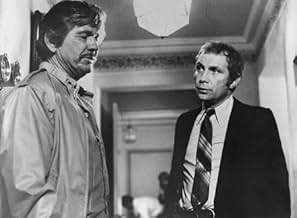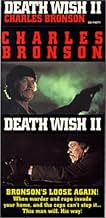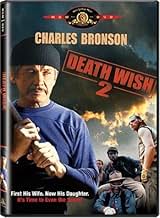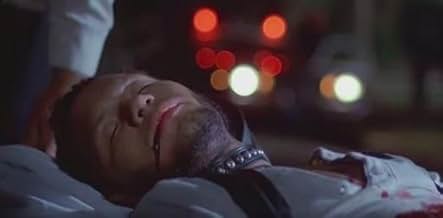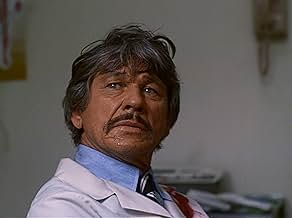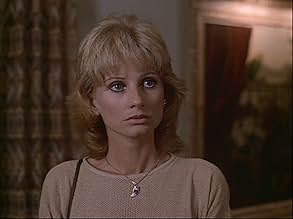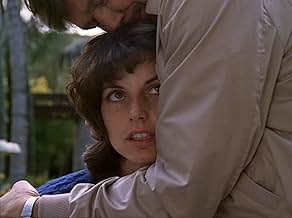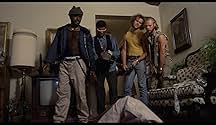VALUTAZIONE IMDb
6,0/10
19.559
LA TUA VALUTAZIONE
L'architetto Paul Kersey diventa nuovamente vigilante quando cerca di trovare i cinque teppisti di strada che hanno ucciso sua figlia e la sua governante, questa volta nelle strade buie di L... Leggi tuttoL'architetto Paul Kersey diventa nuovamente vigilante quando cerca di trovare i cinque teppisti di strada che hanno ucciso sua figlia e la sua governante, questa volta nelle strade buie di Los Angeles.L'architetto Paul Kersey diventa nuovamente vigilante quando cerca di trovare i cinque teppisti di strada che hanno ucciso sua figlia e la sua governante, questa volta nelle strade buie di Los Angeles.
- Regia
- Sceneggiatura
- Star
- Premi
- 2 candidature totali
Thomas F. Duffy
- Nirvana
- (as Thomas Duffy)
Laurence Fishburne
- Cutter
- (as Laurence Fishburne III)
Recensioni in evidenza
Architect Paul Kersey (Charles Bronson) once again becomes a vigilante when he tries to find the five street punks who murdered his daughter and housekeeper, this time on the dark streets of Los Angeles.
Early on, we have a nasty rape scene with Larry Fishburne. I mean really, really nasty. So much so that this film goes above and beyond the darkness from the first film.
That aside, I would say this is every bit as good as the original, and now with more of the 1980s feel (for good reason). We have Bronson kicking more butt, and even with more of a focus (and less moral ambiguity) than before... and Mr. Gardenia returns to really cap off the pure awesome of this series.
Early on, we have a nasty rape scene with Larry Fishburne. I mean really, really nasty. So much so that this film goes above and beyond the darkness from the first film.
That aside, I would say this is every bit as good as the original, and now with more of the 1980s feel (for good reason). We have Bronson kicking more butt, and even with more of a focus (and less moral ambiguity) than before... and Mr. Gardenia returns to really cap off the pure awesome of this series.
Charles Bronson picks up where he left off in the famous "Death Wish" movie of 1976, going after punks and eliminating them. The only differences: he's moved from New York to Los Angeles and the violence is more graphic.
Despite the B-movie feel to this (produced by the kings of the cheapo movies of that era (70s and early 80s) : Golan/Globus, it still is very enjoyable and satisfying - if revenge is your thing. Here, Bronson revenges the death of his daughter. At least her death is quick and bloodless, unlike the unpleasant rape-and-murder scene in the first film.
Also, unlike the first film there is no need for a long setup. Bronson gets back in his vigilante mode in a hurry here and never lets up. If you want a short dose (an hour and a half) of action, this is your movie. One of the gang members in here, by the way, is a young Laurence Fishburne.
The negatives are (1) sub-par acting performances by Bronson and his real-life wife, Jill Ireland; (2) some blatant credibility problems with the story ( such as how Bronson could get across town all bloody but never be noticed;) and (3) not exactly the most intelligent dialog!
Yet, this is still an appealing movie to our conditioned satisfaction for instant revenge. So, if you've had a bad day and need a release of your hostilities, this is a good remedy!
Despite the B-movie feel to this (produced by the kings of the cheapo movies of that era (70s and early 80s) : Golan/Globus, it still is very enjoyable and satisfying - if revenge is your thing. Here, Bronson revenges the death of his daughter. At least her death is quick and bloodless, unlike the unpleasant rape-and-murder scene in the first film.
Also, unlike the first film there is no need for a long setup. Bronson gets back in his vigilante mode in a hurry here and never lets up. If you want a short dose (an hour and a half) of action, this is your movie. One of the gang members in here, by the way, is a young Laurence Fishburne.
The negatives are (1) sub-par acting performances by Bronson and his real-life wife, Jill Ireland; (2) some blatant credibility problems with the story ( such as how Bronson could get across town all bloody but never be noticed;) and (3) not exactly the most intelligent dialog!
Yet, this is still an appealing movie to our conditioned satisfaction for instant revenge. So, if you've had a bad day and need a release of your hostilities, this is a good remedy!
Death Wish 2 is a nasty piece of work, and I mean that in the nicest possible way. There is no pretence about this film, whereas the original Death Wish painstakingly presented Paul Kersey as a victim of violence who had been pushed to breaking point, Death Wish 2 finds him in John Rambo territory, as a borderline crazy person bent on revenge. Unlike the original, Death Wish 2 has no political message and never waivers in its approval of Paul's vigilantism. While this is by no means as good as the original, which I consider to be a minor classic, Death Wish 2 is a great example of the short lived early 80s embrace of ultra violent entertainment before these kind of movies were labelled "video nasties" and expelled from the mainstream.
The main reason why the Death Wish series became increasingly ridiculous is the improbability of one man suffering so much bad luck. This time around a group of thugs break into Paul's home and gang rape his Latina maid. This scene is truly grim and more detailed than most of the more infamous "rape & revenge" movies of the 80s. The scene is particularly distasteful as poor Rosario gets roughed up so much worse than any other female victim in the series - all of whom happen to be white. Unfortunately, I don't think that it is a coincidence, as the entire Death Wish series had dubious racial undertones.
The action becomes increasing twisted when Paul's daughter, Carol, still traumatised from the attack in the original film, is kidnapped and raped. The nastiness of this act stems mostly from the creepy smile on Carol's face. When Carol is subsequently impaled on an iron gate, the transformation from the socially aware film of the 1970s to the sleazy, pure action of the 80s sequel is complete. This time around Paul doesn't even bother with the police, choosing instead to take all of the thugs out himself.
The second half of the film is fairly predictable and a bit slow in comparison with the downright nastiness of the opening half an hour. Paul walks around the streets of LA (he definitely gets around), shooting muggers, rapists and his daughter's attackers. This time around Paul doesn't hesitate shooting anyone and the conflict he demonstrated in the first film is nowhere to be seen. Instead, everyone from civilians to the police comment approvingly on his particular approach to crime control. Needless to say, Death Wish 2 is about as politically incorrect as they come and yet, endearingly of its time.
Michael Winner does a good job of capturing the atmosphere of early 80s LA, with amusing glimpses of religious fanatics, coke dealers and general crazies. The 80s fashion on display is pretty funny and the scene where the thugs dance to their "ghettoblaster" makes me laugh every time. The acting is highlighted by Jill Ireland's extraordinarily wooden turn as Paul's new girlfriend. Her ability to lower the tone of any Charles Bronson movie borders on the supernatural. Lastly, Jimmy Page's soundtrack deserves a mention, it is different to say the least.
If you are looking for cheap, nasty, morally corrupt entertainment, then you should enjoy Death Wish 2. I certainly did.
The main reason why the Death Wish series became increasingly ridiculous is the improbability of one man suffering so much bad luck. This time around a group of thugs break into Paul's home and gang rape his Latina maid. This scene is truly grim and more detailed than most of the more infamous "rape & revenge" movies of the 80s. The scene is particularly distasteful as poor Rosario gets roughed up so much worse than any other female victim in the series - all of whom happen to be white. Unfortunately, I don't think that it is a coincidence, as the entire Death Wish series had dubious racial undertones.
The action becomes increasing twisted when Paul's daughter, Carol, still traumatised from the attack in the original film, is kidnapped and raped. The nastiness of this act stems mostly from the creepy smile on Carol's face. When Carol is subsequently impaled on an iron gate, the transformation from the socially aware film of the 1970s to the sleazy, pure action of the 80s sequel is complete. This time around Paul doesn't even bother with the police, choosing instead to take all of the thugs out himself.
The second half of the film is fairly predictable and a bit slow in comparison with the downright nastiness of the opening half an hour. Paul walks around the streets of LA (he definitely gets around), shooting muggers, rapists and his daughter's attackers. This time around Paul doesn't hesitate shooting anyone and the conflict he demonstrated in the first film is nowhere to be seen. Instead, everyone from civilians to the police comment approvingly on his particular approach to crime control. Needless to say, Death Wish 2 is about as politically incorrect as they come and yet, endearingly of its time.
Michael Winner does a good job of capturing the atmosphere of early 80s LA, with amusing glimpses of religious fanatics, coke dealers and general crazies. The 80s fashion on display is pretty funny and the scene where the thugs dance to their "ghettoblaster" makes me laugh every time. The acting is highlighted by Jill Ireland's extraordinarily wooden turn as Paul's new girlfriend. Her ability to lower the tone of any Charles Bronson movie borders on the supernatural. Lastly, Jimmy Page's soundtrack deserves a mention, it is different to say the least.
If you are looking for cheap, nasty, morally corrupt entertainment, then you should enjoy Death Wish 2. I certainly did.
Lady, you scream and disturb the neighbors, we'll cut you into little pieces and eat you for dinner!
Well, we don't get the great Herbie Hancock score of the first movie, but we do get Jill Ireland, Mrs. Bronson, in one of her last films, directed as Death Wish I and III, by Michael Winner.
We also get what I feel is the biggest collection of scumbags ever assembled. Thomas F. Duffy as Nirvana, Kevyn Major Howard as Stomper, Stuart K. Robinson as Jiver, Laurence Fishburne as Cutter, and E. Lamont Johnson as Punkut. It was fitting that the first kill occurred in a rat- infested building, and the last was an electrocution.
Vincent Gardenia is back to track down Kersey after he starts again in Los Angeles.
Unlike the serious and tragic first film, this is more focused and revenge-oriented. A good film, nonetheless.
We also get what I feel is the biggest collection of scumbags ever assembled. Thomas F. Duffy as Nirvana, Kevyn Major Howard as Stomper, Stuart K. Robinson as Jiver, Laurence Fishburne as Cutter, and E. Lamont Johnson as Punkut. It was fitting that the first kill occurred in a rat- infested building, and the last was an electrocution.
Vincent Gardenia is back to track down Kersey after he starts again in Los Angeles.
Unlike the serious and tragic first film, this is more focused and revenge-oriented. A good film, nonetheless.
The supposed correlation between violence/sexuality in art and violence in reality has been shoved to the forefront of our culture, especially in the past decade, when incidents such as the Columbine massacre confirmed politicians' fears of an unregulated entertainment industry in need of a spanking. In non-fanatical, everyday reality, however, I have come to disagree with the equation above. Some would argue that ugly, violent, nihilistic, and generally misanthropic films like "Death Wish" and its sequels do nothing but contribute to intensifying the more unsavory impulses that lay dormant in the viewer's id.
Yet therein lies the purpose of such rough-edged, unpleasant entertainment. It sparks the id, pummels it into submission, so that when the experience is over, a sigh of relief is uttered.
The original "Death Wish" was a well-done exploitation flick with the professional gloss of an A picture; despite its relatively shallow insight into the murky moral terrain of vigilante justice, it contained an intensely subdued performance by Charles Bronson, and confident direction by Michael Winner.
By comparison, "Death Wish 2" is a typical sequel, taking what the original had and dumbing it down to milk some cash for the franchise. In addition to Bronson (in the role of architect Paul Kersey), a few other characters return to provide at least a superficial connection to the original (Robin Sherwood as his daughter; Vincent Gardenia as the cop that uncovered his identity). The plot is as before: Paul Kersey has begun a new life (courting the cheerfully cardboard Jill Ireland) which is shattered when a gang of punks (including a young Laurence Fishburne) rape and murder his housekeeper and daughter. Unlike the original, no time is spent watching Kersey contemplate his actions; he simply goes to work, and in the process is rendered a stoic killing machine. The characterization/motivation for the punks is given even less thought--they exist for the sole purpose of showing how scummy the scummiest scum of society can be. The film moves from one random encounter to the next, wherein Kersey stumbles across gang members and kills them.
Of course this doesn't sound like highbrow film-making, but "Death Wish 2" never teases the audience with any notions of greatness. In spite of the meager attention given to Kersey's character, we root for him anyway; and in spite of the inexplicably-written punks, we hope for their demise. Michael Winner once again gives the film a gritty yet polished look, though he is clearly directing a flat-out B picture; the pacing is tight (the film runs just under 90 minutes), and the action is competently choreographed (though the romantic subplot provides a respite from the relentless violence, it is shallow and cloying). Jimmy Page's offbeat musical score only adds to the unusual charge this film packs.
In the best-case scenario, "Death Wish 2" is no masterpiece, but the perfect Novocaine to apply after a particularly rotten day. It will numb you into a state of apathy and wash your troubles away (that's a compliment).
Yet therein lies the purpose of such rough-edged, unpleasant entertainment. It sparks the id, pummels it into submission, so that when the experience is over, a sigh of relief is uttered.
The original "Death Wish" was a well-done exploitation flick with the professional gloss of an A picture; despite its relatively shallow insight into the murky moral terrain of vigilante justice, it contained an intensely subdued performance by Charles Bronson, and confident direction by Michael Winner.
By comparison, "Death Wish 2" is a typical sequel, taking what the original had and dumbing it down to milk some cash for the franchise. In addition to Bronson (in the role of architect Paul Kersey), a few other characters return to provide at least a superficial connection to the original (Robin Sherwood as his daughter; Vincent Gardenia as the cop that uncovered his identity). The plot is as before: Paul Kersey has begun a new life (courting the cheerfully cardboard Jill Ireland) which is shattered when a gang of punks (including a young Laurence Fishburne) rape and murder his housekeeper and daughter. Unlike the original, no time is spent watching Kersey contemplate his actions; he simply goes to work, and in the process is rendered a stoic killing machine. The characterization/motivation for the punks is given even less thought--they exist for the sole purpose of showing how scummy the scummiest scum of society can be. The film moves from one random encounter to the next, wherein Kersey stumbles across gang members and kills them.
Of course this doesn't sound like highbrow film-making, but "Death Wish 2" never teases the audience with any notions of greatness. In spite of the meager attention given to Kersey's character, we root for him anyway; and in spite of the inexplicably-written punks, we hope for their demise. Michael Winner once again gives the film a gritty yet polished look, though he is clearly directing a flat-out B picture; the pacing is tight (the film runs just under 90 minutes), and the action is competently choreographed (though the romantic subplot provides a respite from the relentless violence, it is shallow and cloying). Jimmy Page's offbeat musical score only adds to the unusual charge this film packs.
In the best-case scenario, "Death Wish 2" is no masterpiece, but the perfect Novocaine to apply after a particularly rotten day. It will numb you into a state of apathy and wash your troubles away (that's a compliment).
Lo sapevi?
- QuizAccording to Michael Winner's biography, Charles Bronson's alcoholic brother often visited the set to borrow money. Bronson was careful not to give him too much in case someone might kill him for it. He was later found dead in a cheap hotel room having been stabbed in the buttocks.
- BlooperKay tells Kersey he will wait three minutes before ringing the security alarm, yet he only waits about a minute or less.
- Citazioni
Paul Kersey: You believe in Jesus?
Stomper: Yes, I do.
Paul Kersey: Well, you're gonna meet him.
[Paul shoots Stomper dead]
- Versioni alternativeThe R-rated US release is heavily edited missing part of the rape scene of the maid and most of the rape scene of Kersey's daughter (and her graphic suicide). The uncut version is available on BluRay.
- ConnessioniFeatured in Not for Women Only: Episodio datato 15 febbraio 1982 (1982)
- Colonne sonoreGo, Tell It on the Mountain
Traditional
Performed by the church congregation
I più visti
Accedi per valutare e creare un elenco di titoli salvati per ottenere consigli personalizzati
Dettagli
- Data di uscita
- Paese di origine
- Lingue
- Celebre anche come
- El vengador anónimo II
- Luoghi delle riprese
- 1716 North Western Avenue, Los Angeles, California, Stati Uniti(Pioneer Chicken where Paul Kersey stares at the punks)
- Aziende produttrici
- Vedi altri crediti dell’azienda su IMDbPro
Botteghino
- Budget
- 2.000.000 USD (previsto)
- Lordo Stati Uniti e Canada
- 16.100.000 USD
- Lordo in tutto il mondo
- 16.100.000 USD
Contribuisci a questa pagina
Suggerisci una modifica o aggiungi i contenuti mancanti





